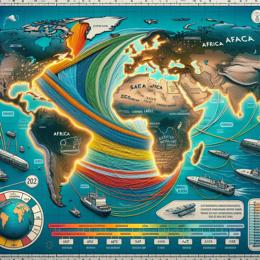Image created by AI
Starlink's Strategic Move into South Africa Amid Regulatory Challenges and Political Influence
Elon Musk, who emigrated from South Africa at the age of 17, is now negotiating with South African President Cyril Ramaphosa about investing in the country through his ventures, including Starlink—SpaceX’s ambitious satellite internet service—and Tesla Inc.’s potential battery production facilities.
Discussions have focused on adjusting local ownership requirements that currently restrict Starlink’s operations in South Africa. These rules mandate significant local Black ownership, which Musk aims to renegotiate to facilitate the entry of his satellite network. In exchange, Musk has proposed substantial investments in sectors critical to South Africa, such as advanced battery manufacturing for electric vehicles.
As Ramaphosa seeks to attract investments, negotiations have gained complexity and importance with Musk's increased visibility in global politics, particularly through his advisory role to former U.S. President Donald Trump. This association enhances Musk’s leverage in negotiations, suggesting potential economic benefits could sway regulatory adjustments in South Africa.
The engagement between Musk and South African officials highlights broader global shifts as countries reassess their telecommunications policies to tap into Musk’s burgeoning tech and industrial empire. With SpaceX’s Starlink, Musk promises rapid Internet service enhancements, especially appealing to regions plagued with unreliable connectivity.
Globally, Starlink has expanded significantly, serving over 4 million users across more than 100 countries by deploying thousands of satellites that bolster Internet accessibility. This expansion often challenges existing telecom providers and navigates diverse regulatory landscapes, which have historically included protectionist policies and equity-sharing requirements.
In South Africa, unauthorized use of Starlink has surged, prompting warnings from the telecommunications authority, ICASA, about potential fines to curb illegal use of the service. This situation underscores the demand and critical need for updated regulations that align with technological advancements and economic opportunities offered by international tech firms.
Negotiations in South Africa reflect broader trends where countries are gradually modifying or eliminating restrictive telecom policies to accommodate new technologies like Starlink. Such shifts are part of a global recalibration in the tech sphere, influenced by political, economic, and social factors pushing towards more open, technologically driven markets.
The outcome of these talks could set a precedent for how other nations approach similar negotiations with tech giants, balancing national interests with global technological advancements. As South Africa navigates this complex terrain, the world watches how this blend of politics, business, and technology will unfold, shaping the future of international tech investments and regulatory frameworks in Africa and beyond.










